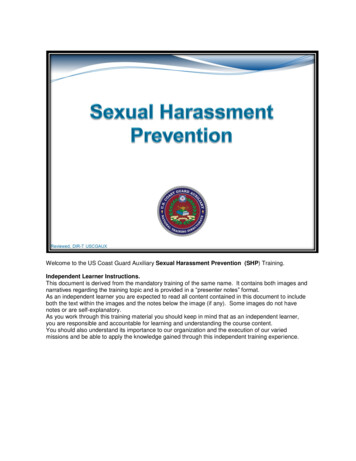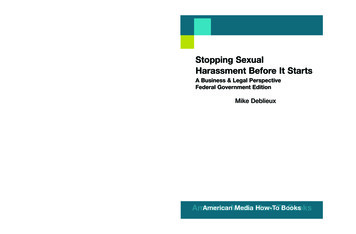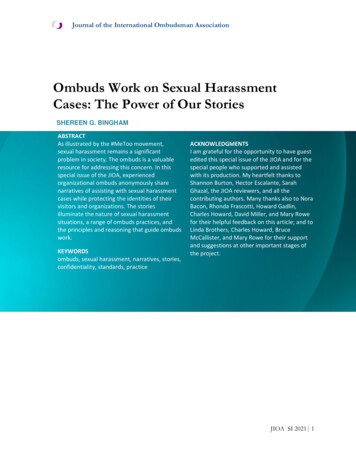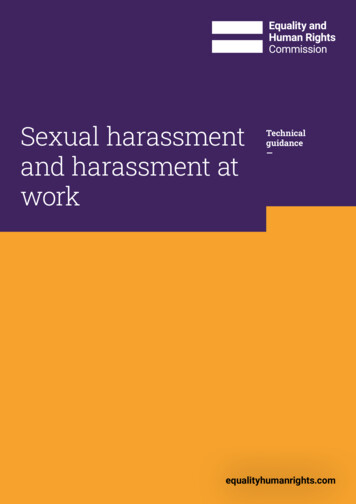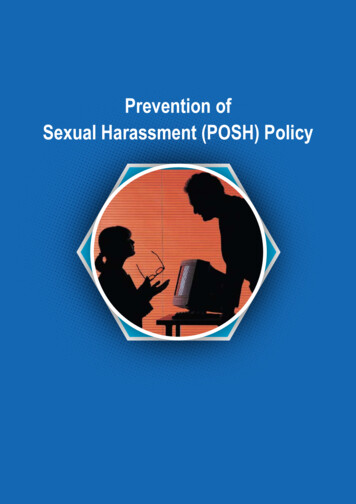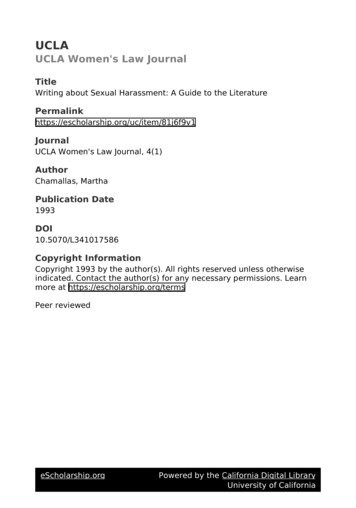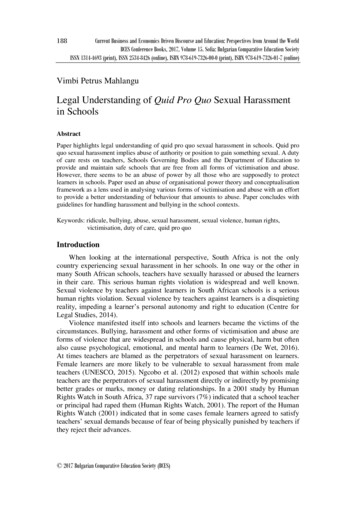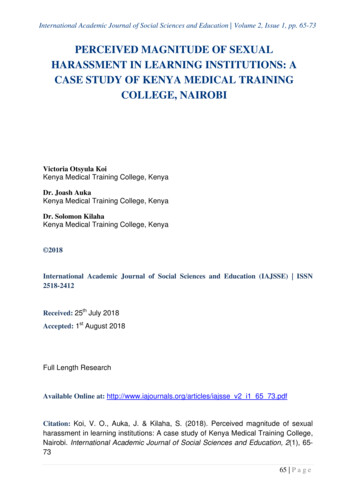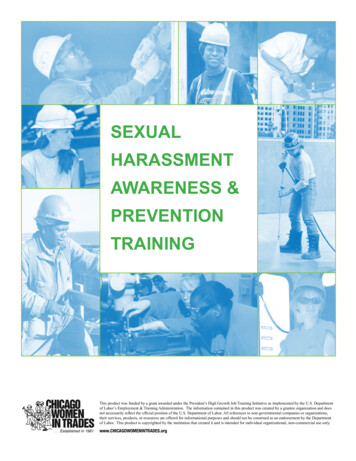
Transcription
SexualHarassmentAwareness &PreventionTrainingThis product was funded by a grant awarded under the President’s High Growth Job Training Initiative as implemented by the U.S. Departmentof Labor’s Employment & Training Administration. The information contained in this product was created by a grantee organization and doesnot necessarily reflect the official position of the U.S. Department of Labor. All references to non-governmental companies or organizations,their services, products, or resources are offered for informational purposes and should not be construed as an endorsement by the Departmentof Labor. This product is copyrighted by the institution that created it and is intended for individual organizational, non-commercial use only.www.CHICAGOWOMENINTRADES.org
Sexual Harassment: Points for DiscussionUse this scale to rate the statements below:ABCDEstrongly agreeagreedisagreestrongly disagreedon’t know1.The extent of a victim’s resistance is a major factor in determining ifsexual harassment has occurred.2.The goal of sexual harassment is power.3.There must be repeated acts of harassment in order to consider it aviolation of the law.4.Victims can successfully resist harassers if they try.5.Victims often pretend that they are sexually harassed to get attention orto cover poor work performance.6.Sexual harassment will always be part of the construction or skilledmanufacturing workplace because you can’t change attitudes.7.Victims invite sexual harassment by their dress and by their actions.8.Sexual harassment is just innocent flirtation and most people areflattered by it.9.Women who complain of sexual harassment are too sensitive, especiallyin a male-dominated industry.HANDOUT 1
Sexual Harassment: The LawSexual harassment is illegal under federal law. Title VII of the Civil Rights Act of 1964makes it illegal to discriminate against employees because of race, color, religion,sex or national origin. This law gives employees the right to a workplace free ofintimidation, insult or ridicule based on any of these factors. Some state and local lawsalso prohibit sexual harassment.It shall be unlawful employment practice for an employer (1) to fail or refuseto hire or to discharge any individual, or otherwise to discriminate against anyindividual with respect to his compensation, terms, conditions or privileges ofemployment because ofsuch individual’s race, color, religion, sex, ornational origin or (2) to limit, segregate, or classify his employees or applicantsfor employment in any way which would deprive or tend to deprive any individualof employment opportunities or otherwise adversely affect his status as anemployee, because of such individual’s race, color, religion, sex or nationalorigin.In 1980 the Equal Opportunity Employment Commission (EEOC), the federal agencythat enforces the Civil Rights Act, issued guidelines that define sexual harassment:Unwelcome sexual advances, requests for sexual favors and other verbal or physicalconduct of a sexual nature are sexual harassment when: A worker must submit to implicit or explicit sexual demands in order tokeep a job (quid pro quo harassment),whether a worker submits to implicit or explicit sexual demands affectsemployment decisions such as assignments and promotions, orthe conduct creates an intimidating, hostile or offensive workingenvironmentAn employer is liable for any sexual harassment in the workplace by a supervisor,whether or not the employer knew about the harassment. An employer is also liable forany sexual harassment by a co-worker if he or she either knew about it or should haveknown about it.HANDOUT 2
What Is Sexual Harassment?Sexual harassment is: Any unwelcome verbal or physical sexual advance, Sexually explicit derogatory statements, Sexually discriminatory remarks, made by someone in the workplace, which are offensive orobjectionable to the recipient, cause the recipient discomfort, create a hostile atmosphere, orinterfere with the recipient’s job performance.Sexual harassment may include: Verbal harassment or abuse Subtle pressure for sexual activities Unnecessary touching, patting or pinching Leering at a person’s body Constant brushing against a person’s body Demanding sexual favors accompanied by implied or overt threats concerning one’s job,promotion, performance evaluation, etc. Displaying sexually explicit or degrading materials that other find objectionable Physical assaultWhat Is The Law?In 1980, the U.S. Equal Employment Opportunity Commission issued guidelines which state,“Harassment on the basis of sex is a violation of Section 703 of Title VII of the Civil Rights Act of1964.”According to these guidelines, unwelcome sexual advances, requests for sexual favors, and otherverbal or physical conduct of a sexual nature constitute sexual harassment when: You must submit to implicit or explicit demands in order to keep your job, or Your submission to or rejection of such conduct is used as a basis for employment decisionsabout you, or Such conduct had the effect of unreasonably interfering with your work performance or creating anoffensive, hostile, or intimidating work atmosphere.Employers are responsible for harassment caused by employees in supervisory positions regardlessof whether officials of the company knew or should have known of the incident. If the harassmentis by co-workers or non-employees temporarily at your place of work, the employer can be heldresponsible if you have informed a supervisor or other manager of the incident and the employerhas failed to take immediate and appropriate action. Employers have a duty to try to prevent sexualharassment.Both the Illinois Human Rights Act and the Chicago Human Rights Ordinance specifically prohibitsexual harassment and have similar regulations concerning employers’ responsibility to prevent andappropriately handle complaints of sexual harassment.
Kinds of Sexual HarassmentThere are two legal types of sexual harassment:QUID PRO QUO – Harassment by a supervisor, superintendent or other person in authority.In quid pro quo harassment, the harasser demands a sexual favor; in return the victim keeps the job,gets a promotion, good assignments, or other job-related benefits.HOSTILE WORK ENVIRONMENT – Harassment by a co-worker that is unwanted andrepeated. Hostile work environment harassment can be asking for dates, makes sexual remarks, ordisplaying offensive pictures.Women in the construction industry report a whole range of behaviors that can be considered sexualharassment, including: Being touched in sexual waysWorking around pictures of naked and nearly naked womenWorking in areas with sexual graffitiRequests for “dates”Comments on their appearanceRemarks about their sex livesRemarks about the harasser’s sex lifeWhistlingLeeringObscene jokesJokes that put women downSexual rumors“Pranks” with sexual overtonesBeing called sweetie, honey, baby, form etc.Being stared at constantlyAssault, and RapeHANDOUT 3
Is This Sexual Harassment?Mark each item with one of the following answers:YESNOMAYBE?If you think it is sexual harassmentIf you do not think it is sexual harassmentIf you think it may be sexual harassmentIf you are not sure1. Male employees whistle at a female employee as she walks through the warehouse.2. A male worker asks a female co-worker if she ‘got any’ over the weekend.3. A male on a crew asks a female on the crew out for a date. She says no; she’s not interested, he continues toask.4. A crew leader writes notes with sexual innuendos and leaves them in a female worker’s locker.5. Pin-ups of naked women are hanging in the shop.6. A supervisor puts a hand on a worker’s shoulder and says ‘You’re really doing a great job. Let’s go out for adrink later and talk about your future with the company.’7. A male worker puts his hand over a female worker’s to demonstrate how to use a tool. He takes his hand awayas soon as he finished the demonstration.8. The guys are going out for a drink after work. They ask the female workers to come along.9. Julio works in a large downtown office building at night. One of the guys who works late has followed himaround, asking him to have a drink with him. Julio does not understand English very well and decides to avoidgoing to that office. He has been reprimanded for not cleaning that office.10. Steve regularly leers at Sandra’s body, focusing on her breasts, hips and butt. It disorients Sandra to theextent that she sacrifices time and energy to go out of her way to avoid Steve’s workstation.HANDOUT 4
More Scenarios for Identifying Types of Sexual Harassment1. Nancy and Isabel work in the same office. Whenever Nancy is near Isabel, she make a point of touching heror brushing up against her. Isabel doesn’t like it and has told Nancy that it upsets her. Nancy persists.2. Steve is a forklift operator. All of her co-workers are female. He is young and attractive and the women taketurns teasing him about his physique and making suggestive remarks. As a result, Steve often finds it hardto concentrate on his work. This has led to errors, and Steve has been given a warning by his boss. Stevehas now asked the women to stop, but they treat it as a big joke and continue.3. Pictures of naked women are displayed all over Sandra’s workplace. One picture features a naked womanwith the words “USDA Choice” stamped across her body as if she were a piece of meat. A dartboard in thesupervisor’s office is decorated with a drawing of a woman’s breast, with the nipple as the bull’s eye.4. A foreman has to choose who to lay off. He tells a female worker that if she agrees to go out with him shewon’t get laid off.5. A female trainee at a tool and die shop complains to her trainer that she does not like him rubbing up againsther when they are working together. The trainer tells her that it comes with working in this field.6. Tony, a volunteer, reported that Eric, the supervisor, has been allegedly cornering him into a room everymoment he gets and asking him to perform sexual favors. Tony informed Eric of his discomfort and informedEric’s superior.7. The Administrative Associate stated that he is being approached by an external delivery woman every timeshe makes a delivery to the organization, which happens to be every week. He informed her that he was notinterested and that she should no longer ask him out again, yet the delivery person continues.
IT’S NOT FUNNY.IT’S NOT FLATTERY.IT’S NOT YOUR FAULT.IT’S SEXUAL HARASSMENT.IT’S AGAINST THE LAW.Coalition ofLabor Union Women
What To Do if You Are HarassedIf you think you are being harassed, trust your instincts. You probably are. Get supportas you deal with the harasser, from a friend, a family member or a tradeswomen’sorganization. Find out what your company’s policies on sexual harassment are. Keepgood records of the harassment, and try to find witnesses. Think about what youmay want for a resolution to the problem (perhaps a transfer to a different area, atransfer for the harasser, or firing of the harasser). Then try these steps for an informalresolution.Your First StrategiesMany tradeswomen say that some men test their reactions to low-level sexualharassment almost immediately. This kind of testing includes comments on theirappearance, requests for dates, sexual innuendoes, etc. A direct, immediate responseis the best one: “Joe, my name is Alice. Don’t say, ‘Hey, baby.”“Don’t touch me.”“Thanks, but I’m not interested in going out. I don’t mix work with mysocial life.”“I don’t appreciate that kind of sexual talk and I don’t want to hear it anymore.”Some women combine directness with humor: “I can’t cook to save my soul.”“My six kids go wherever I go.”“Why on earth are you asking me out?”
The Next StepsIf these kinds of responses don’t work and the harassment continues or increases,it’s time to take action. Any one of these steps may stop the harassment, which is, ofcourse, your goal.1) Record all incidents of harassment. For each incident, record as exactly asyou can: the date, place and time of the incident what was said or done, and any witnesses to the harassment.It’s difficult to remember incidents clearly later, even though you’re sure that you willwhen they happen. Use the notebook you keep for times like this to write down whathappened. Record only what happened, not your reactions. (Write “John said suchand such,” not “John said such and such and I’d like to strangle him.”) If your casegoes to court, you will have an accurate record of what happened.Writing down what has happened is also a very powerful tool against harassment.Taking out your notebook and writing down what has just happened will help calm youdown. It is also very threatening to your harasser. He wants to see you upset, notcalm, and the last thing he wants is a record of his behavior.Make copies of your records, especially if you take them to work with you.2) Say ‘no’ and say it clearly.“I don’t want you to ask me out any more. This is sexual harassment, and it offendsme. I want you to stop right now.” Try to do this when witnesses are around. Again,write in your notebook the date, place, time and any witnesses.3) Write a letter to the harasser. Use your records to make it very specific. Besure to keep a copy of the letter.“On April 2, 1992, at 2:00 p.m. on the 2nd floor of the parking garage at State and ElmStreets, you said ‘I’d love to get into your pants.” On April 5th, at 3:30 p.m. on the thirdfloor of the garage you said the same thing. I am very offended by this. You muststop. If anything like this happens again, I will have to report it.”
4) Try to find out if other women have been harassed by this person.There is strength in numbers, and/or it’s possible that there may already be acase against him or her, in which case management may be more cooperative andaccommodating.5) Tell your supervisor about the harassment and show him or her your records.If the harasser is your supervisor, tell his or her supervisor.Be prepared to answer questions like these:Are you willing to submit a written complaint?What happened?Who was involved?When did the action occur?Has it happened before? How many times? How often? How long has this beengoing on?Where did this take place?Were there any witnesses?What effect did this have on you? (economic, physical, psychological)What have you done about this so far?What is your relationship with the harasser outside of work?Is anyone else having the same problem?What do you want done about it?Your employer is required to investigate complaints of sexual harassment immediatelyand thoroughly. Most investigations begin with confidential hearings for both the victimand the accused harasser. If your employer finds that your complaint is valid, he orshe must make sure that the harassment stops. If you have suffered financially oremotionally as a result of the harassment, they are liable for monetary damages.6) If your employer does not investigate, or if you do not agree with theconclusions of the investigation, speak to your union steward. He or she will beable to advise you about what you should do next.7) File a union grievance. Your union steward can help you with this procedure.8) If none of these steps stop the harassment, you should contact atradeswomen’s organization or a lawyer experienced with sexual harassmentcases to discuss your legal options. They can help you decide your next step.
Chicago, Illinois Municipal Code on Sexual Harassment1-1-04“Sexual harassment” means any unwelcome sexual advances or requests for sexualfavors or conduct of a sexual nature when (a) submission to such conduct is madeeither explicitly or implicitly a term or condition of an individual’s employment; or (b)submission to or rejection of such conduct by an individual is used as the basis for anyemployment decision affecting the individual; or (c) such conduct has the purpose oreffect of substantially interfering with an individual’s work performance or creating anintimidating, hostile or offensive working environment. Chicago Municipal. Code, §2160-010(l). See also Subpart 340.100, Reg. 420.170 & Reg. 520.140.
You Have a Right to a Safe and Healthful Workplace.IT’S THE LAW! You have the right to notify your employer or OSHA about workplace hazards. You may askOSHA to keep your name confidential. You have the right to request an OSHA inspection if you believe that there are unsafe andunhealthful conditions in your workplace. You or your representative may participate in theinspection. You can file a complaint with OSHA within 30 days of discrimination by your employer formaking safety and health complaints or for exercising your rights under the OSH Act. You have a right to see OSHA citations issued to your employer. Your employer must post thecitations at or near the place of the alleged violation. Your employer must correct workplace hazards by the date indicated on the citation and mustcertify that these hazards have been reduced or eliminated. You have the right to copies of your medical records or records of your exposure to toxic andharmful substances or conditions. Your employer must post this notice in your workplace.The Occupational Safety and Health Act of 1970 (OSH Act), P.L. 91-596, assures safeand healthful working conditions for working men and women throughout the Nation.The Occupational Safety and Health Administration, in the U.S. Department of Labor,has the primary responsibility for administering the OSH Act. The rights listed heremay vary depending on the particular circumstances. To file a complaint, report anemergency, or seek OSHA advice, assistance, or products, call 1-800-321-OSHA oryour nearest OSHA office: Atlanta (404) 562-2300 Boston (617) 565-9860 Chicago(312) 353-2220 Dallas (214) 767-4731 Denver (303) 844-1600 Kansas City (816)426-5861 New York (212) 337-2378 Philadelphia (215) 861-4900 San Francisco(415) 975-4310 Seattle (206) 553-5930. Teletypewriter (TTY) number is 1-877-8895627. To file a complaint online or obtain more information on OSHA federal andstate programs, visit OSHA’s website at www.osha.gov. If your workplace is in a stateoperating under an OSHA-approved plan, your employer must post the required stateequivalent of this poster.1-800-321-OSHAwww.osha.gov Occupational Safety and Health Administration OSHA 3165 U.S. Department ofLabor
LEGAL HELP!ILLINOIS DEPARTMENT OF HUMAN RIGHTS100 WEST RANDOLPHCHICAGO, ILLINOIS(312) 814-6200Covers sexual harassment claims for employees of any size firm (for other discrimination cases, atleast 15 employees are required.) Must file within 180 days of alleged violation.U.S. EQUAL EMPLOYMENT OPPORTUNITY COMMISSION536 SOUTH CLARK STREETCHICAGO, ILLINOIS(312) 353-2713TDD: (312) 353-2421Only covers employers with at least 15 employees. Must file within 300 days of alleged violation.CHICAGO COMMISSION ON HUMAN RELATIONS510 NORTH PESHTIGOCHICAGO, ILLINOIS(312) 744-4111TDD: (312) 744-1088Violation must have occurred in Chicago. No minimum number of employees. Must file within 180days of alleged violation.COOK COUNTY COMMISSION ON HUMAN RIGHTS69 WEST WASHINGTON, SUITE 2900CHICAGO, ILLINOIS 60602(312) 603-1100TDD: (312) 443-6050
employee, because of such individual's race, color, religion, sex or national origin. In 1980 the Equal Opportunity Employment Commission (EEOC), the federal agency that enforces the Civil Rights Act, issued guidelines that define sexual harassment: Unwelcome sexual advances, requests for sexual favors and other verbal or physical

